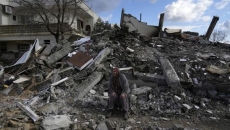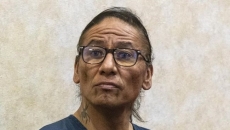VANCOUVER - Canadian photojournalist Amber Bracken and news organization the Narwhal have filed a lawsuit against the RCMP, claiming Bracken was wrongfully arrested and detained for three nights while reporting on a British Columbia pipeline dispute.
The lawsuit seeks a court declaration that Bracken's constitutional rights to liberty and freedom of the press were unlawfully breached in November 2021, when police arrested her during an operation to enforce an injunction granted to the company building the Coastal GasLink pipeline.
The claim filed in B.C. Supreme Court on Monday argues Bracken didn't breach the injunction because she was there as a journalist and the RCMP were notified that she was a member of the media before, during and after her arrest.
Narwhal executive editor Carol Linnitt says the outlet had written to the RCMP the day before the arrest, alerting them to Bracken's presence, and she carried a letter of assignment along with camera gear and tags indicating she was a journalist.
Linnitt told a press conference outside B.C. Supreme Court that Bracken's arrest was the latest in "a string of incidents that display a troubling lack of regard for freedom of the press by Canadian police," including previous arrests of journalists at Indigenous-led protests in Ontario and Newfoundland and Labrador.
None of the claims have been tested in court and statements haven't yet been filed in response to the lawsuit, which lists the B.C. and federal governments, RCMP Chief Supt. John Brewer and three unknown RCMP officers as defendants.
The Narwhal did not file the lawsuit solely for its own team and Bracken, "but to clear a path for all journalists in Canada to do their work without risk of police interference," editor-in-chief Emma Gilchrist told the news conference.
"Infringements on press freedom by police impact the public's right to know."
The lawsuit also claims special and punitive damages over Bracken's arrest.
Bracken says she was in Wet'suwet'en territory on what she thought would be a preliminary reporting trip to visit several camps set up by those opposed to the natural gas pipeline, but unbeknownst to her, tensions had been escalating.
She says she was already behind the boundary of an exclusion zone police set up as part of their operation, and on the morning of the arrests, she was inside a "tiny house," which she had chosen as the best vantage point for taking photos.
Bracken says officers arrived by helicopter and emerged from the woods to surround the structure, breaking down the door with an axe and chainsaw.
Although Bracken says she immediately told them she was a journalist, she was arrested and remained in custody for three nights.
"As a journalist, I never wanted to be the story," she says. "But the police took that decision from me, when they finally made it impossible for me to do my job."
Bracken and a documentary filmmaker were initially charged with civil contempt of court and conditionally released by a judge three days after their arrests, but the next month, court documents showed the charges would not be pursued.
Bracken has worked on a freelance basis for The Canadian Press.
Opposition among Wet'suwet'en hereditary chiefs to the 670-kilometre pipeline sparked rallies and rail blockades across Canada in 2020, while the elected council of the Wet'suwet'en First Nation and others nearby have agreed to the project.
A construction updated posted by Coastal GasLink last month says construction is nearly 80 per cent complete on the pipeline that would transport natural gas from Dawson Creek in northeastern B.C. to a processing facility on the coast in Kitimat.






